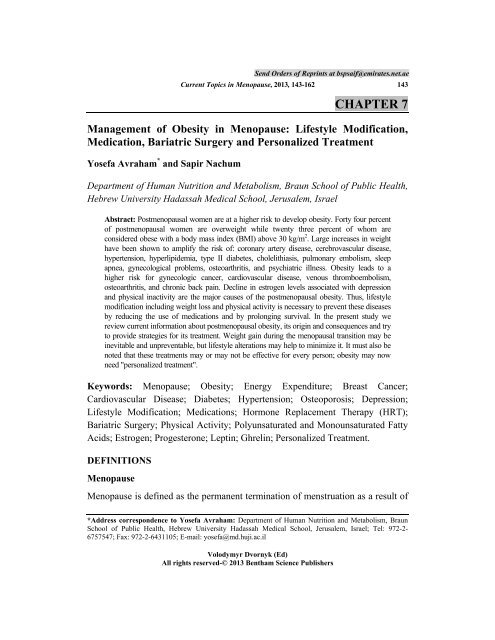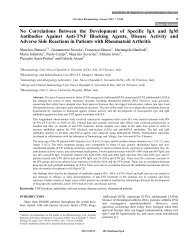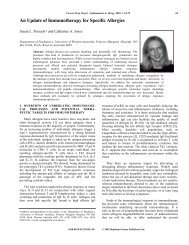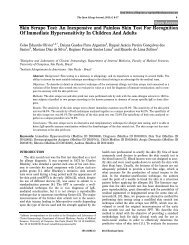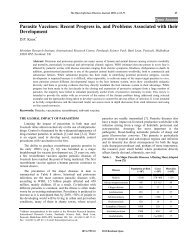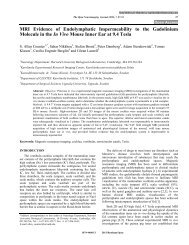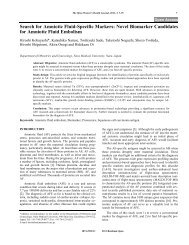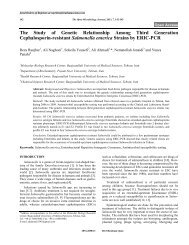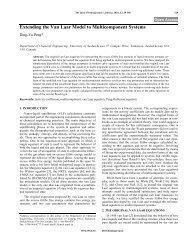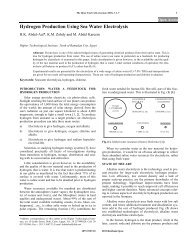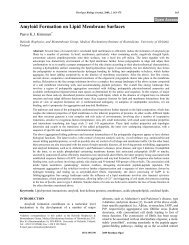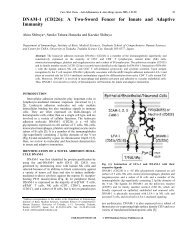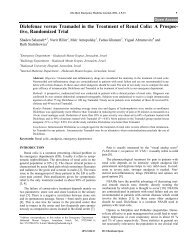Download - Bentham Science
Download - Bentham Science
Download - Bentham Science
You also want an ePaper? Increase the reach of your titles
YUMPU automatically turns print PDFs into web optimized ePapers that Google loves.
Current Topics in Menopause, 2013, 143-162 143<br />
CHAPTER 7<br />
Management of Obesity in Menopause: Lifestyle Modification,<br />
Medication, Bariatric Surgery and Personalized Treatment<br />
Yosefa Avraham * and Sapir Nachum<br />
Department of Human Nutrition and Metabolism, Braun School of Public Health,<br />
Hebrew University Hadassah Medical School, Jerusalem, Israel<br />
Abstract: Postmenopausal women are at a higher risk to develop obesity. Forty four percent<br />
of postmenopausal women are overweight while twenty three percent of whom are<br />
considered obese with a body mass index (BMI) above 30 kg/m 2 . Large increases in weight<br />
have been shown to amplify the risk of: coronary artery disease, cerebrovascular disease,<br />
hypertension, hyperlipidemia, type II diabetes, cholelithiasis, pulmonary embolism, sleep<br />
apnea, gynecological problems, osteoarthritis, and psychiatric illness. Obesity leads to a<br />
higher risk for gynecologic cancer, cardiovascular disease, venous thromboembolism,<br />
osteoarthritis, and chronic back pain. Decline in estrogen levels associated with depression<br />
and physical inactivity are the major causes of the postmenopausal obesity. Thus, lifestyle<br />
modification including weight loss and physical activity is necessary to prevent these diseases<br />
by reducing the use of medications and by prolonging survival. In the present study we<br />
review current information about postmenopausal obesity, its origin and consequences and try<br />
to provide strategies for its treatment. Weight gain during the menopausal transition may be<br />
inevitable and unpreventable, but lifestyle alterations may help to minimize it. It must also be<br />
noted that these treatments may or may not be effective for every person; obesity may now<br />
need "personalized treatment".<br />
Keywords: Menopause; Obesity; Energy Expenditure; Breast Cancer;<br />
Cardiovascular Disease; Diabetes; Hypertension; Osteoporosis; Depression;<br />
Lifestyle Modification; Medications; Hormone Replacement Therapy (HRT);<br />
Bariatric Surgery; Physical Activity; Polyunsaturated and Monounsaturated Fatty<br />
Acids; Estrogen; Progesterone; Leptin; Ghrelin; Personalized Treatment.<br />
DEFINITIONS<br />
Menopause<br />
Send Orders of Reprints at bspsaif@emirates.net.ae<br />
Menopause is defined as the permanent termination of menstruation as a result of<br />
*Address correspondence to Yosefa Avraham: Department of Human Nutrition and Metabolism, Braun<br />
School of Public Health, Hebrew University Hadassah Medical School, Jerusalem, Israel; Tel: 972-2-<br />
6757547; Fax: 972-2-6431105; E-mail: yosefa@md.huji.ac.il<br />
Volodymyr Dvornyk (Ed)<br />
All rights reserved-© 2013 <strong>Bentham</strong> <strong>Science</strong> Publishers


